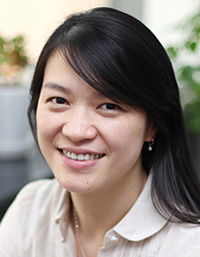Home> Plenary speakers
Zeng Yi
Updated: 2020-11-20

Zeng Yi
Ph.D., Professor
Institute of Biochemistry and Cell Biology, Shanghai Institutes for Biological Sciences, Chinese Academy of Sciences
Research Interests
The decision of stem cells to self-renew or differentiate into progenitors is regulated at multiple levels, including cell-intrinsic transcriptional programs and extra-cellular signals originating from a specialized niche. The mouse mammary gland provides an excellent system to study the adult stem cell self-renewal signals, as the organ develops post-natally, arises from stem cells and is readily generated from transplanted cells. We previously established that Wnts promote the self-renewal of mammary stem cells. Furthermore, we developed a method to culture and expand mammary stem cells in vitro for a long period with the maintenance of their full development potential.
In the Zeng Lab, we combine molecular, cell biology and mice genetic approaches to identify the cellular mechanisms and the factors that regulate adult stem and progenitor cell behavior. We focus on the following questions:
1) What is the mechanism through which Wnt signals maintain the stem cell multipotent state?
2) How do the stem cells and their niche interact?
3) What is complete lineage of mammary development?
Our long-term goal is to determine how the stem and progenitor cell regulatory mechanisms have deviated in breast cancer, and to learn how to control the players in these machineries for the purposes of regenerative and cancer medicine.
Selected Publications
1. Yu QC, Verheyen EM,Zeng YA*. Mammary Development and Breast Cancer: A Wnt Perspective. Cancers. Jul 13;8(7).pii: E65. doi: 10.3390/cancers8070065. (2016)
2. Yu QC, Song W, Wang D, Zeng YA*. Identification of blood vascular endothelial stem cells by the expression of protein C receptor. Cell Research. Jul 1. doi: 10.1038/cr.2016.85. (2016)
3. Zeng L+, Cai C+, Li S, Yu QC, Wang W, Li Y, Chen J, Zhu X*, Zeng YA*. Essential roles of Cyclin Y-like 1 and Cyclin Y in dividing Wnt-responsive mammary stem/progenitor cells. PLOS Genetics. May 20;12(5):e1006055 (2016)
4. WANGD+, Zeng YA*. Identification of Multipotent Mammary Stem Cells by Protein C Receptor Expression. Nature. Jan 1;517(7532):81-4 (2015)
5. Cai C, Yu QC, Jiang W, Liu W, Song W, Yu H, Zhang L, Yang Y, Zeng YA*. R-spondin1 is a novel hormone mediator for mammary stem cell self-renewal. Genes Dev. Sep 26;28: 2205–2218 (2014)
6. Harburg G, Compton J, Liu W, Iwai N, Zada S, Marlow R, Strickland P, Zeng YA, Hinck L. SLIT/ROBO2 Signaling Promotes Mammary Stem Cell Senescence by Inhibiting Wnt Signaling. Stem Cell Reports. Sep 9;3(3):385-93 (2014)
7. Jan TA, Chai R, Sayyid ZN, van Amerongen R, Xia A, Wang T, Sinkkonen ST, Zeng YA, Levin JR, Heller S, Nusse R, Cheng AG. Tympanic border cells are Wnt-responsive and can act as progenitors for postnatal mouse cochlear cells. Development. Mar;140(6):1196-206 (2013)
8. Zeng YA*. Beyond nutrients and bonding: p63-positive progenitors in breast milk. Cell Cycle. Feb 15;10(4):579-8 (2011)
9. Zeng YA and Nusse R*. Wnt proteins serve as self-renewal factors for mammary stem cells and promote their long-term expansion in culture. Cell Stem Cell. Jun 4;6(6):568-77 (2010)
10. Minear S, Leucht P, Jiang J, Liu B, Zeng A, Fuerer C, Nusse R, and Helms JA. Wnt proteins promote bone regeneration. Science Translational Medicine. Apr; 28;2(29):29ra30 (2010)
11. Nusse R, Fuerer C, Ching W, Harnish K, Logan C, Zeng A, Ten Berge D, Kalani Y. Wnt Signaling and Stem Cell Control. Cold Spring HarbSymp Quant Biol. ;73:59-66 (2008)
12. Zeng YA+, Rahnama M+, Wang S, Lee W, Verheyen EM*. Inhibition of Drosophila Wg signaling involves competition between Mad and Armadillo/beta-catenin for dTcf binding. PLoS ONE. Dec; 3(12):e3893 (2008)
13. Zeng YA+, Rahnama M+, Wang, Sosu-Sedzorme W, Verheyen EM*. Drosophila Nemo antagonizes BMP signaling by phosphorylation of Mad and inhibition of its nuclear accumulation. Development. Jun; 134(11):2061-71 (2007)
14. Zeng YA and Verheyen EM*. Nemo is an inducible antagonist of Wingless signaling during Drosophila wing development.Development. Jun; 131(12):2911-20 (2004)
